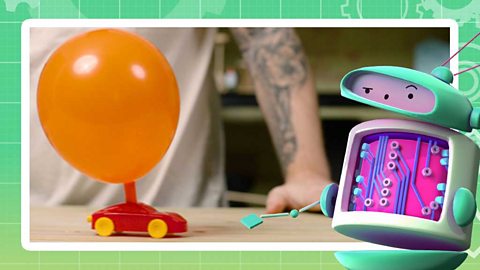What are gears?
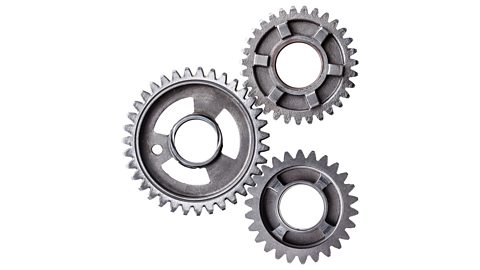
A gearA gear is a mechanical part with teeth that interlock with another gear or belt to transfer motion and power while changing speed, or direction in a mechanical system. is a special wheel that has parts called teeth around its outer edge (its circumferenceThe circumference is the measurement of the distance around the outer edge of a circular or rounded object, such as a circle or a wheel.).
These teeth interlockTo interlock means to connect or engage two or more parts in a way that they fit together securely, stopping separation or movement. with the teeth of another gear, belt or chain.
When two or more gears are connected, they transfer motion and power from one gear to another.
Gears can be found in machinery including bicycles, cars and clocks.

What are pulleys?
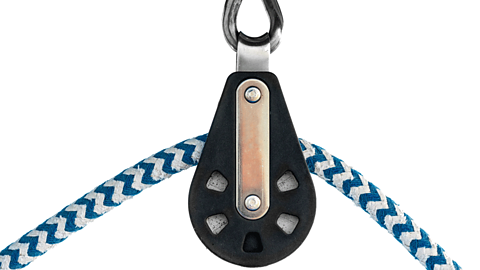
A pulleyA pulley is a simple machine made up of a grooved wheel on an axle. It guides a rope, belt, or cable and changes the direction of or the amount of force that is needed to lift an object. is a type of wheel that has an inner groove in its circumference.
When a rope, cable or belt runs along the groove, objects can be moved and lifted with far less effort.
It’s easier when two people share the lifting of heavy objects and pulleys work in the same way.
When you pull the rope, the pulley helps you lift heavy objects more easily because it spreads out the effort needed between the pulley and your hands.
Pulleys are found in lifts, cranes, car engines and garage doors.

Video: Gears and pulleys
Join Sam in his workshop to learn how gears and pulleys work.
Have you ever seen a flag being raised, or wondered how a mechanical clock works? Let’s take a look at some of the simple mechanisms that they use.
Pulleys and gears.When a flag is raised, it will often be lifted using a pulley mechanism.
A pulley is a wheel on a fixed axle. The wheels normally have a groove in them, to guide a rope or cable through. One end of the rope is attached to a load that needs to be lifted. Then the other end of the rope is looped through the groove on the pulley wheel.
When you pull the opposite end of the rope, the pulley mechanism changes the direction of the force applied, which lifts a load like this.
The more pulley wheels you add to the mechanism, the less force is required to move the load. Pulleys are used to help lift many things. Lifts, window blinds and cranes often use pulley systems. Let’s change gear to look at gears.
Gears are also wheels attached to a fixed axle, but rather than a groove, they have little teeth that can slot together with other gear wheels. When one gear wheel turns, the other turns too, in the opposite direction.
If the gear wheels are different sizes, they can be used to change the rotating speed and the turning force of the other gear wheel.For example, if we have a larger gear wheel attached to a smaller gear wheel like this, when we turn the larger gear wheel, the smaller gear wheel rotates more quickly. This is how bicycles work.
They use a chain to connect the gears. When you turn the pedals, the force turns the larger gear. This then turns the smaller gear, which rotates much more quickly on the back wheel, making the bicycle move forward.
Some bicycles also have gear systems that allow you to change the size of the gear wheel, making it easier to pedal uphill.Gears are also used in clocks, watches and engines.
So, there we are: gears and pulleys.
Mechanisms that use wheels and circular motion to make things move.
Explaining gears
Gear speed
When a smaller gear interlocks with a larger gear, the larger one turns more slowly than the smaller one which turns quickly.
When a larger gear turns a smaller gear, you can get more speed.
Gear power
When a smaller gear turns a larger gear, the larger gear turns at a slower rate than the smaller gear but it is more powerful.
This combination of gears lets a bicycle convert fast pedalling into a slower but more powerful rotation of a wheel. This can help you with climbing a steep hill.
Gear ratio
ln the example below, the larger gear is twice as big as the smaller gear, with twice as many teeth.
The smaller gear will rotate twice for every one rotation of the larger gear. We call this a gear ratio of 2:1.
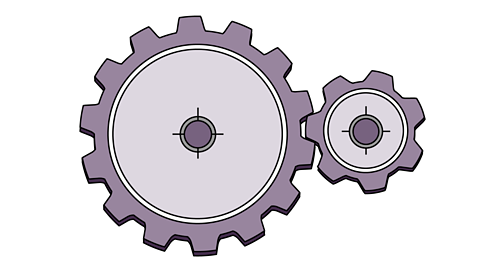
Direction of rotation
Gears can also change the direction of rotation. When gears are interlocked, they turn in opposite directions.
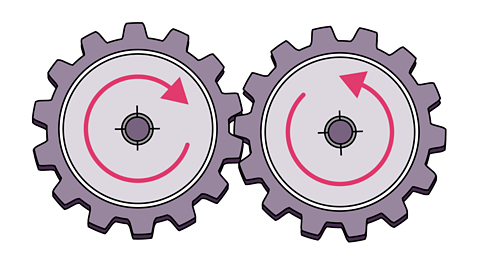
Explaining pulleys
Fixed pulleys and moveable pulleys are two of the most common types of pulleys.
Fixed pulleys
Fixed pulleys are attached to something like a ceiling or a tower.
When someone pulls the rope down, the load moves up, making it easier to lift heavy objects.
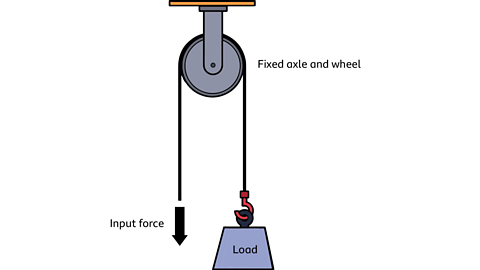
Movable pulleys
In movable pulleys, one end of the rope is fixed, and the pulley itself is free to move.
When someone pulls the free end of the rope, the load goes up, and you halve the force required.
These types of pulleys can be found in cranes and lifts.
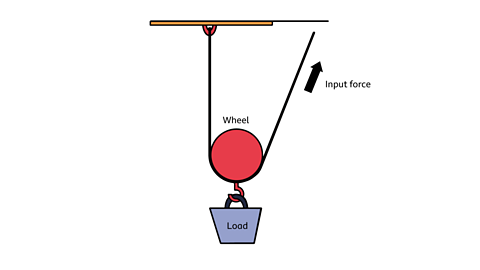
How to make a gear system
Follow these steps to create your own cardboard gear system.
Before you start you will need:
- 1 small wheel
- 1 medium wheel
- 1 large wheel
- 1 piece of corrugated cardboard
- 1 cocktail stick or safety pin
- 3 dowels
- 1 pencil
- Some PVA glue
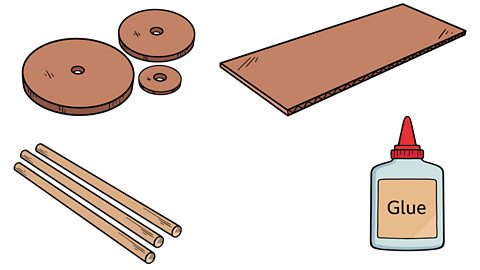
Image caption, Step 1
Take out your materials and place them on the table.
Image caption, Step 2
Remove the top layer of cardboard to get to the corrugated part. Wetting the top layer can help with this.
Image caption, Step 3
Cut the corrugated cardboard into three strips. Each strip should be the same length as the diameter of one of your wheels.
Image caption, Step 4
Glue the flat edge of the cardboard strips around the diameter of the wheels.
Image caption, Step 5
Lay out your gears on a piece of cardboard with the edges touching. Mark out the position of the centre of each gear on the cardboard with a cocktail stick or safety pin.
Image caption, Step 6
Remove the gears and make small holes in the cardboard with a sharp pencil where the centre of the gears will go.
Image caption, Step 7
Put glue into the holes in the wheels and insert the dowels. Leave to the glue to dry.
Image caption, Step 8
Turn one of your gears and watch how it turns the other two.
1 of 8
Did you know?
Here are some facts about gears and pulleys that you might not know.
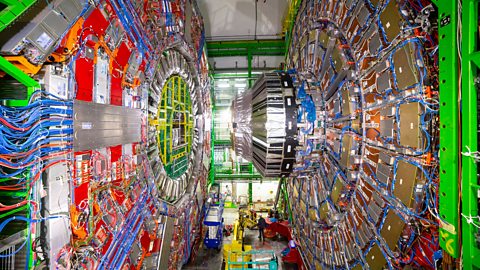
Image caption, Large Hadron Collider
One of the largest gears in the world can be found in the Large Hadron Collider (LHC) at CERN in Switzerland. The main gear in the LHC measures around 7 metres in diameter.
Image caption, International Space Station
The International Space Station (ISS) uses a pulley system in its robotic arm. It is used for various tasks, including capturing and docking with spacecraft.
Image caption, Antikythera mechanism
The Antikythera mechanism, which dates back to ancient Greece, is an example of early gear technology. It's believed to be one of the world's first analogue computers.
Image caption, Micro-mechanical systems
In some micro-mechanical systems, tiny gears with teeth just a few micrometres wide have been created.
1 of 4
Key words
| Circumference | The measurement of the distance around the outer edge of a circular or rounded object. |
| Gear | A mechanical part with teeth that interlock with another gear or belt to transfer motion and power while changing speed, or direction in a mechanical system. |
| Interlock | To connect or engage two or more parts in a way that they fit together securely, stopping separation or movement. |
| Pulley | A simple machine consisting of a grooved wheel on an axle. It guides a rope, belt, or cable. |
| Wheel | A circular object that rotates around a central axis. |
Quiz
Time to put your knowledge to the test. Can you tell the difference between a gear and a pulley?
More on Mechanical systems
Find out more by working through a topic
- count5 of 5
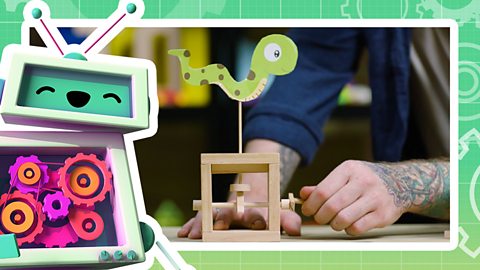
- count1 of 5
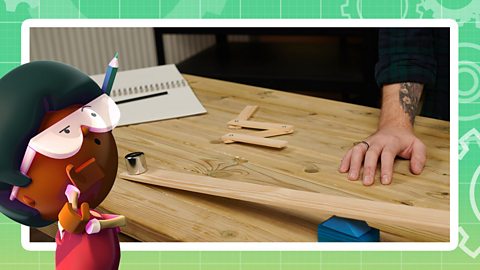
- count2 of 5
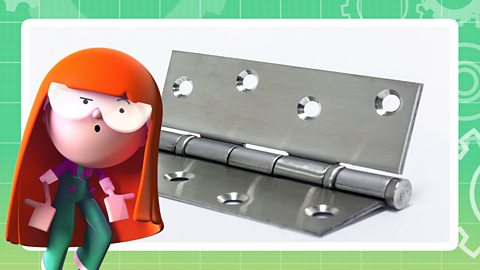
- count3 of 5
